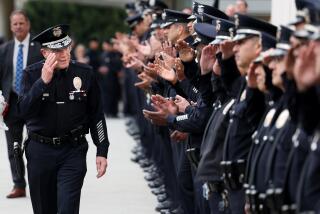Personality Tests Assume New Character in Civic Affairs
- Share via
When Ken Hammond took over as Indio’s new fire chief last year, he inherited the common woe of an overworked, underbudgeted department.
But instead of appealing to voters or the City Council for more funds, he sought help from a far more unlikely source: a psychologist.
As part of the remedy, Hammond and 11 of his top officers took a personality quiz designed to identify their behavioral styles and show them how to work more efficiently as a team.
In doing so, they joined thousands of other public officials in perhaps 200 municipalities throughout the state who have recently turned to such tests in an attempt to boost productivity within California’s city halls, police departments and fire departments.
“The only resource that I can expand around here is the human resource,” Hammond said. “In order to do that, I’ve got to figure out what makes the human resource tick.”
While personality testing has been used in private industry for decades, it is only within the last half a dozen years that public officials have begun to embrace the brief questionnaires as a way of better understanding behavior in the work place. Although some psychologists have questioned the scientific validity of the devices, municipal officials defend them as an effective management tool.
Partly because fiscal pressures have forced municipalities to behave more like businesses, cities from Ventura to Palm Springs to Anaheim to Ukiah have begun to consider the $3,000 to $8,000 spent on a personality quiz and daylong seminar to be a wise investment.
“I think they’re finally realizing that, in municipalities, people are it,” said Sonia Powers, a San Clemente psychologist who works with about 25 Southern California municipalities. “You can have the best-equipped facility in the world, but if you’re not taking care of your people, it’s all worthless.”
Not everyone, however, is a believer in the one-page tests. Robert Hogan, chairman of the psychology department at the University of Tulsa, said that the quizzes tell very little about job performance, especially compared to the longer, more sophisticated exams available to the profession.
“Those tests are snake oil,” said Hogan, who is an expert on personality testing, according to the American Psychological Assn. “It’s like a fortune cookie . . . a party game.”
Bruce Klonsky, an associate professor of psychology at the State University of New York in Fredonia, agreed.
“I’d be a little bit wary,” he said. “Even though it takes a little bit longer to fill out (more sophisticated tests), I’d sleep a little bit better at night knowing they were a little more accurate in assessing an individual.”
But municipal officials say they do not look to the quizzes for detailed psychological screening. The profiles, which are usually just one of several tools used when a psychologist works with a municipality, simply help to get people thinking about their working relationships, they say.
“It’s a fun way to begin dealing with basic organizational issues,” said Norm King, city manager of Palm Springs, where about 100 employees have taken such quizzes. “The biggest benefit is just understanding that everyone’s not like yourself.”
One of the quizzes most widely used by public officials in the state is the Personal Profile System, a set of 24 questions published in Minneapolis by Performax, a division of the Carlson Learning Co.
Each question lists a set of four descriptive terms, such as fussy, obedient, unconquerable and playful. Other samples include attractive, God-fearing, stubborn and sweet, or argumentative, adaptable, nonchalant and light-hearted.
The respondent is then given seven minutes to decide which of the words in each set best describes his work behavior, and which describes him the least. The results are graphed according to four personality traits--dominance, influence, steadiness and compliance--from which 15 personality patterns can be drawn.
Developed in 1963 by behavioral scientist John G. Geier, the quiz, or “self-assessment tool,” as company spokesmen call it, has been used by more than 6 million people worldwide, according to Carlson officials.
‘Surprisingly Accurate’
“It’s a dynamite tool,” said D. Kent Payne, city manager of the small Northern California town of Ukiah, pop. 13,000.
“That thing is surprisingly accurate,” agreed Everett Millais, director of community development in Ventura, where more than 300 city employees have taken the quiz in the last two years. “Hopefully, it’s made me do my job a little bit better.”
Although no programs exist in Los Angeles city or county governments, officials in numerous other California municipalities say the quiz and its jargon are frequently applied to daily tasks.
For example, Hammond, the Indio fire chief, said that he has the meticulous “C-type,” or compliance, trait and likes to analyze all the details of an issue. The quiz helped him deal with the problems that would sometimes arise when he met up with one of his D-type, or dominant, fire captains.
Prod His Co-Workers
“They want an immediate reaction, you know, ‘Do it right now,’ ” Hammond said. “Sometimes that’s an irritation to me. But now I realize that I need that kind of person to keep me from sitting on things.”
Michael Sorg, public services director in San Clemente, said that he works with several I-type people who have the influence trait, meaning they are social and group-oriented. Sorg, a D-type, sometimes uses the quiz terminology to prod his co-workers when they spend too much time joking and hanging around the water cooler.
“I’ll say, ‘Holy mackerel, one “I” trying to outdo the other,’ ” he said. “And they’ll respond by saying, ‘Here comes a “D” trying to screw things up again.’ But it’s non-threatening. Everybody laughs.”
‘Stick to Business’
And, in the Capistrano division of the California Highway Patrol, Capt. Steve Malone said the quiz has taught him to adjust his I-type personality to meet the demands of some of the D-type officers he works with.
“You just don’t beat around the bush. You stick to business,” Malone said. “As an ‘I,’ I have a tendency to kind of fool around and joke about things. I have to recognize that, and in recognizing that, I think I’m more effective.”
Although municipal officials contacted by The Times say they have never required an employee to take the quiz, they also point out that none has ever objected when asked if he was interested in participating. And while the results of the quiz are usually confidential, they add, most employees are eager to share their profiles with co-workers.
Procedure Went Sour
There is an instance, however, when the procedure went sour. A former financial officer in Ventura last year filed a $6.3-million lawsuit against the city, alleging that information shared with the psychologist as a result of the quizzing caused him to be denied a promotion.
Fred L. Patrick, who last month resigned as assistant to the finance director, contends that he was stripped of his authority and forced to undergo therapy after disgruntled employees complained about his management style.
“It seems obvious that (the) negativity toward Mr. Patrick stems from Mr. Patrick’s refusal to participate in the city’s mandatory psychological testing-counseling program, and/or from confidential information . . . obtained about Mr. Patrick through it,” wrote his attorney, Richard A. Weinstock, in a March 16, 1987, letter to the city.
Court Records
Although Ventura officials have declined to comment on the pending litigation, court records indicate that Patrick’s supervisor already believed that there were tensions in the office before the psychologist’s arrival.
“I felt that I needed to take some action to bring people together--to have them work harmoniously rather than in the disharmony which is clearly the case now,” wrote John McMillan, management services director, in a confidential memo to Patrick in 1986.
“I viewed the ‘personal profile’ as the catalyst or tool which would begin to build understanding rather than perpetuate distrust.”
EMPLOYEE TRAITS
Increasingly, municipal administrators are using a quiz to determine the personality traits of employees.
An employee is asked to mark whether the trait listed within a four-item group is most or least like his own personality.
Results of the quiz are graphed according to four personality traits--dominance, influence, steadiness and compliance--from which 15 personality patterns can be drawn.
Trait Most Least Attractive God-fearing Stubborn Sweet Fussy Obedient Unconquerable Playful Argumentative Adaptable Nonchalant Light-hearted
More to Read
Sign up for Essential California
The most important California stories and recommendations in your inbox every morning.
You may occasionally receive promotional content from the Los Angeles Times.













